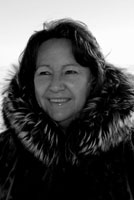Sheila Watt-Cloutier

Born in 1953 in Kuujjuaq, Quebec, Sheila Watt-Cloutier lived a traditional Inuit life until the age of 10. “I travelled only by dogsled for the first decade of my life,” she recalls. Watt-Cloutier now faces a very different landscape—one in which global warming is eroding the Arctic’s delicate environment and the Inuit way of life.
A resident of Iqaluit, Watt-Cloutier describes barren soil normally covered by snow and ice, caribou traveling north beyond their normal range, and seals struggling to birth and raise pups without the shelter of snowy dens. For Watt-Cloutier, an Inuk woman, mother, and grandmother, negative effects on human life in the North are directly linked to the worsening state of the environment and its creatures. “Our emotional, spiritual, and cultural well-being and health depend on protecting the land,” says Watt-Cloutier. “We cannot find our way with band-aid solutions. For Inuit, the environment is everything.”
For those in the South who do not yet feel the effects of the creeping damage, Watt-Cloutier shares a warning: “The Arctic is the health barometer of the world and we, the Inuit, are the mercury of that barometer,” says Watt-Cloutier, “As goes the Arctic, so goes the world.”
Watt-Cloutier is facing the challenges of climate change head-on. She has been a political spokesperson for Inuit for over a decade, elected as President of the Inuit Circumpolar Conference (ICC) Canada in 1995 and re elected in 1998. Watt-Cloutier was instrumental in the global negotiations that led to the 2001 Stockholm Convention banning the generation and use of persistent organic pollutants that contaminate the arctic food web. In 2002, Watt-Cloutier was elected the international Chair of ICC, representing internationally the 155,000 Inuit of Canada, Greenland, Alaska, and Chukotka in the Far East of the Federation of Russia.
Watt-Cloutier’s recent efforts have culminated in a motion to file a human rights claim against the United States, the world’s biggest green house gas producer, on the grounds that their refusal to adequately reduce emissions is threatening the health, culture, and livelihood of the Inuit.
Watt-Cloutier has received many honours, including the Global Environment Award from the World Association of Non-Governmental Organizations in 2002, the 2004 Aboriginal Achievement Award for Environment, and the 2005 United Nations Champion of the Earth Award and the Sophie prize in Norway (following in the footsteps of Nobel Peace prizewinner Wangari Maathai). In 2006, she was awarded the inaugural Northern Medal by the outgoing Governor General of Canada, Adrienne Clarkson, the International Environmental Leadership Award by Global Green USA, and the Citation of Lifetime Achievement at the Canadian Environment Awards.
Watt-Cloutier sums up her work by saying: “I do nothing more than remind the world that the Arctic is not a barren land devoid of life but a rich and majestic land that has supported our resilient culture for millennia. Even though small in number and living far from the corridors of power, it appears that the wisdom of the land strikes a universal chord on a planet where many are searching for sustainability.”
Today, The University of Winnipeg is honoured to present Sheila Watt-Cloutier with an Honorary Doctor of Laws for her tireless efforts as an environmental activist, humanitarian, and ambassador of the North.
